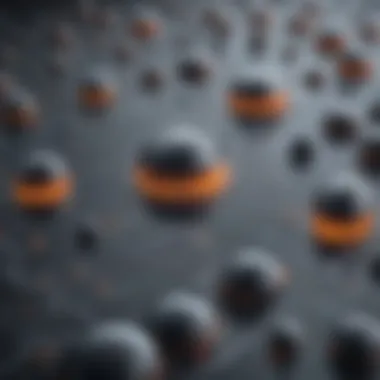Unraveling the Intricacies of Liquid Insulators in Electrical Systems


Overview of Liquid Insulators in Electricity
Liquid insulators in electricity are a captivating subject of study, offering a unique perspective on the behavior of electrical systems. Their properties and applications play a crucial role in various technological advancements, making them a focal point of interest for tech enthusiasts, professionals, and inquisitive minds. Delving into the dynamics of liquid insulators sheds light on their significant impact within the realm of electricity.
Fundamentals of Liquid Insulators
Understanding the core principles and theories related to liquid insulators is vital for grasping their role in electrical systems. Key terminology and definitions play a pivotal role in elucidating the behavior of these insulators. Exploring basic concepts and foundational knowledge provides a solid framework for comprehending the intricacies of liquid insulators' function within the domain of electricity.
Practical Applications of Liquid Insulators
Real-world case studies and applications serve as tangible examples of how liquid insulators are utilized in practical settings. Demonstrations and hands-on projects offer a hands-on approach to witnessing the capabilities of these insulators in action. Including code snippets and implementation guidelines further enhance the practicality of utilizing liquid insulators in various electrical applications.
Advanced Exploration and Emerging Trends
Keeping abreast of cutting-edge developments in the field of liquid insulators is essential for staying at the forefront of technological advancements. By delving into advanced techniques and methodologies, one can gain valuable insights into the future prospects and upcoming trends regarding the utilization of liquid insulators in electricity.
Tips and Resources for Further Understanding
For individuals keen on further exploring liquid insulators, recommended books, courses, and online resources serve as valuable tools. Additionally, having access to specialized tools and software enhances practical usage and implementation of liquid insulators in diverse electrical scenarios.
Introduction to Liquid Insulators
In the realm of electricity, the significance of liquid insulators cannot be understated. From providing a crucial barrier to ensuring the safety and efficiency of electrical systems, liquid insulators play a pivotal role. Their unique properties and applications form the backbone of modern technologies, making them a focal point of exploration in this article. By delving into the depths of liquid insulators, we uncover a world of intriguing possibilities and potential advancements in electrical engineering.
Defining Liquid Insulators
Properties of Liquid Insulators
Liquid insulators possess distinct characteristics that distinguish them from other insulation materials. Their ability to resist the flow of electrical current effectively is a defining feature. Additionally, the high dielectric strength of liquid insulators makes them ideal for applications in high voltage environments, ensuring reliable performance under demanding conditions. Despite these advantages, liquid insulators may have limitations such as susceptibility to contamination or degradation over time, which warrant careful consideration in various electrical systems.
Types of Liquid Insulators
Diverse types of liquid insulators cater to different requirements in electrical applications. Each type offers specific benefits, whether it be enhanced thermal conductivity, chemical stability, or environmental friendliness. Understanding the unique features of various liquid insulators is crucial for selecting the most suitable option for a particular use case. While some types excel in specific conditions, others may pose challenges related to viscosity or temperature sensitivity, highlighting the importance of assessing their advantages and disadvantages beforehand.


Importance in Electrical Systems
Role in Preventing Electrical Leakage
The role of liquid insulators in preventing electrical leakage is paramount for system safety and longevity. By effectively isolating conductive components, liquid insulators mitigate the risk of short circuits and malfunctions. Their ability to maintain a stable insulation barrier ensures the uninterrupted flow of electricity, minimizing the potential for accidents or equipment damage. Incorporating liquid insulators strategically in electrical systems promotes reliability and performance consistency.
Applications in High Voltage Systems
In high voltage systems, the application of liquid insulators is essential for maintaining operational integrity. Liquid insulators facilitate the insulation of components exposed to extreme voltages, safeguarding them against arcing and breakdown. Their compatibility with a wide voltage range and compatibility with various materials make them versatile for diverse high voltage applications. However, challenges such as careful monitoring of dielectric properties and handling precautions underscore the nuanced nature of employing liquid insulators in high voltage environments.
Characteristics of Liquid Insulators
Liquid insulators play a crucial role in the realm of electricity due to their unique properties and applications. Understanding the characteristics of liquid insulators is essential for comprehending their significance in various electrical systems. These insulators exhibit distinct conductivity and resistance properties compared to solid insulators, impacting the overall functionality of electrical circuits. Their dielectric strength in high voltage environments is a key factor to consider, influencing their effectiveness and practical limitations in diverse applications.
Conductivity and Resistance
Impact on Electrical Circuits
The conductivity and resistance of liquid insulators have a profound impact on electrical circuits, altering the flow of current and ensuring the smooth operation of systems. Liquid insulators possess specific characteristics that allow them to regulate and control the movement of electricity within circuits. This property makes them a preferred choice in scenarios where precise conductivity levels are required for optimal performance. Despite some limitations, such as susceptibility to contamination, the ability of liquid insulators to resist electrical currents efficiently is a highly advantageous feature in various electrical setups.
Comparison with Solid Insulators
When compared to solid insulators, liquid insulators offer unique advantages in terms of conductivity and resistance. Their fluid nature enables them to adapt to different environmental conditions, ensuring consistent performance across a wide range of applications. Unlike solid insulators, liquid counterparts can fill irregular spaces and provide better sealing properties, enhancing the overall efficiency and reliability of electrical systems. However, challenges such as maintenance requirements and stability issues may pose certain disadvantages that need to be addressed to maximize the benefits of using liquid insulators.
Dielectric Strength
Effectiveness in High Voltage Environments
The dielectric strength of liquid insulators plays a crucial role in ensuring their effectiveness in high voltage environments. These insulators exhibit a high tolerance for electric fields, allowing them to withstand significant voltage levels without breakdown. This characteristic is particularly important in applications where insulation integrity is paramount for preventing electrical failures and ensuring safety. The superior dielectric strength of liquid insulators makes them a reliable choice for high voltage conditions, offering enhanced protection against electrical discharges and insulation breakdown.
Limitations and Considerations
Despite their impressive dielectric strength, liquid insulators have certain limitations and considerations that must be taken into account. Factors such as temperature sensitivity and compatibility with other materials can impact their performance and longevity. Additionally, the presence of impurities or contaminants in liquid insulators can compromise their dielectric properties, leading to potential vulnerabilities in electrical systems. Understanding these limitations and implementing appropriate measures to address them are crucial in harnessing the full potential of liquid insulators for diverse applications.


Applications of Liquid Insulators
Liquid insulators, a crucial component in electrical systems, play a pivotal role in ensuring the smooth operation and safety of various applications. These insulators are designed to inhibit the flow of electrical current, preventing unwanted leakages and ensuring the efficiency of electrical devices and machinery. Understanding the significance of liquid insulators in power management is essential for maintaining a reliable electrical infrastructure.
Transformer Systems
Role in Power Distribution
In the realm of power distribution, liquid insulators serve a vital purpose in facilitating the efficient transmission of electricity from the source to end-users. Their ability to resist electrical conductivity is instrumental in preventing power loss and ensuring the stability of the electrical grid. Liquid insulators excel in isolating components and mitigating the risks of short circuits, contributing to the overall reliability of power distribution networks. Their distinct advantage lies in providing a seamless flow of electricity while minimizing energy wastage, making them a preferred choice for optimizing power distribution systems.
Enhancing Efficiency
Liquid insulators play a key role in enhancing the efficiency of transformer systems by reducing energy dissipation and enhancing the overall performance of electrical equipment. By effectively insulating components and minimizing electromagnetic interference, liquid insulators aid in maintaining stable operating conditions and maximizing the lifespan of transformers. Their unique feature lies in improving energy transfer efficiency and minimizing heat generation, thus enhancing the overall efficiency of transformer systems. While liquid insulators offer significant benefits in enhancing operational effectiveness, considerations such as compatibility with different transformer configurations and environmental impact should be taken into account to optimize their usage.
Industrial Settings
Utilization in Manufacturing Processes
In industrial settings, liquid insulators are invaluable for maintaining electrical insulation in machinery and equipment used in manufacturing processes. Their ability to withstand high temperatures and harsh conditions makes them a preferred choice for ensuring the safe and reliable operation of industrial equipment. Liquid insulators play a critical role in preventing electrical failures and enhancing the performance of manufacturing machinery, contributing to improved productivity and operational efficiency. Despite their benefits, challenges such as proper maintenance and monitoring of liquid insulators should be addressed to ensure their continuous effectiveness in industrial applications.
Maintaining Safety Standards
Liquid insulators not only enhance operational efficiency in industrial settings but also play a crucial role in maintaining safety standards. By providing a reliable barrier against electrical currents and preventing electrical shocks, liquid insulators safeguard personnel and equipment from potential hazards. Their unique feature lies in mitigating the risks associated with electrical malfunctions and ensuring a secure working environment for employees. While the advantages of liquid insulators in maintaining safety standards are profound, considerations such as proper installation and compliance with industrial regulations are essential to uphold safety protocols effectively.
Future Innovations and Research
Liquid insulators hold a pivotal role in the realm of electricity, continually evolving through innovative research and technological advancements. The exploration of future innovations and research within the context expounds upon the perpetual quest to enhance the efficacy and sustainability of liquid insulators in diverse applications. This section sheds light on the proactive endeavors aimed at refining the performance and ecological footprint of liquid insulators, paving the way for optimized electrical systems with minimal environmental impact.
Emerging Trends
Sustainable Liquid Insulators
The manifestation of sustainable liquid insulators signifies a significant breakthrough in the domain of electrical engineering. These insulators are designed with the explicit purpose of reducing carbon footprint and ensuring long-term viability. By incorporating eco-friendly materials and manufacturing processes, sustainable liquid insulators contribute to a more environmentally conscious approach in electrical system design. Their low toxicity and biodegradability further underscore their role in promoting a greener technological landscape, aligning with the growing emphasis on sustainable practices in modern industries.


With enhanced thermal stability and insulating properties, sustainable liquid insulators offer a compelling solution for mitigating environmental impact without compromising performance. Their ability to withstand high voltage conditions while minimizing energy losses positions them as a preferred choice for eco-conscious applications. However, challenges related to cost-effectiveness and scalability persist, necessitating ongoing research and development to address these barriers and maximize the potential of sustainable liquid insulators.
Technological Advancements
Technological advancements in liquid insulators have revolutionized the landscape of electrical insulation, fostering improved functionality and reliability. The integration of cutting-edge technologies such as nanomaterials, advanced polymers, and predictive maintenance systems has propelled the efficiency and performance of liquid insulators to unprecedented levels. These innovations facilitate real-time monitoring of insulation properties, preempting potential faults and optimizing operational efficiency in electrical systems.
By harnessing the principles of nanotechnology and data analytics, technological advancements empower liquid insulators to adapt dynamically to varying environmental conditions, ensuring optimal performance under fluctuating load demands. The seamless integration of smart sensors and Io T connectivity enables enhanced diagnostic capabilities, paving the way for predictive maintenance strategies that enhance the longevity of liquid insulators. While technological advancements offer unparalleled advantages in terms of reliability and efficiency, considerations regarding cybersecurity and data protection are paramount to safeguarding the integrity of electrical infrastructure.
Challenges and Opportunities
Innovation in Liquid Insulator Design
Innovation in liquid insulator design represents a gateway to unraveling new possibilities for enhancing the functionality and sustainability of electrical insulation systems. By exploring novel materials, geometric configurations, and application-specific requirements, innovators can redefine the benchmarks of efficiency and performance in liquid insulators. The pursuit of innovative designs aims to address prevalent issues such as energy losses, material degradation, and environmental impact, fostering a paradigm shift towards more robust and eco-friendly insulation solutions.
Emphasizing flexibility, adaptability, and scalability, innovative liquid insulator designs transcend conventional limitations to deliver unparalleled insulation performance in varying operational environments. The integration of multifunctional coatings, advanced composites, and additive manufacturing techniques stands at the forefront of innovation, promising a new era of durability and efficiency in liquid insulator applications. However, the translation of innovative concepts into commercial products necessitates meticulous testing, validation, and standardization to ensure regulatory compliance and optimal performance under real-world conditions.
Environmental Impact Considerations
The evaluation of environmental impact considerations in liquid insulators frames a critical discourse on the sustainability and ethicality of electrical insulation practices. Addressing issues related to carbon footprint, resource depletion, and end-of-life disposal, environmental impact considerations underscore the imperative of adopting eco-conscious strategies in liquid insulator development and deployment. By employing life cycle assessments, emission reduction measures, and recyclability assessments, stakeholders can mitigate the ecological footprint of liquid insulators and align with global sustainability goals.
The incorporation of renewable materials, eco-friendly production processes, and circular economy principles exemplifies a proactive approach towards minimizing environmental impact across the lifecycle of liquid insulators. Encouraging recycling initiatives, energy-efficient manufacturing techniques, and responsible waste management practices enrich the eco-sustainability profile of liquid insulator technologies, fostering a harmonious coexistence between technological progress and environmental preservation.
Conclusion
Summarizing the discourse on future innovations and research, the exploration of emerging trends, challenges, and opportunities elucidates the dynamic landscape of liquid insulators in electricity. From sustainable insulators to technological advancements, the evolution of these vital components continues to reshape the contours of electrical engineering, propelling towards a future defined by efficiency, reliability, and sustainability.
Conclusion
The [Conclusion] section of this article serves as a vital summary of the profound significance of liquid insulators in the realm of electricity. It encapsulates the essence of how these insulators play a pivotal role in ensuring the smooth and safe functioning of electrical systems. By elaborating on the crucial aspects discussed throughout the article, the Conclusion emphasizes the necessity of understanding and utilizing liquid insulators in modern technological applications. Furthermore, it sheds light on the various considerations and benefits associated with the adoption of liquid insulators, presenting a holistic view of their impact on enhancing efficiency and safety within electrical setups.
Key Takeaways
Impact of Liquid Insulators
Exploring the [Impact of Liquid Insulators] provides a profound insight into how these substances revolutionize the landscape of electrical insulation. One of the key characteristics of liquid insulators is their exceptional dielectric properties, allowing them to effectively prevent electrical leakage and ensure the reliable operation of high voltage systems. The unique feature of adaptability sets liquid insulators apart, making them a versatile and preferred choice for various electrical applications. While their advantages include high dielectric strength and thermal conductivity, it is essential to consider the potential drawbacks, such as compatibility issues with certain materials. Understanding the nuances of liquid insulators' impact is crucial for harnessing their benefits effectively in technological advancements.
Future Implications
Delving into the [Future Implications] of liquid insulators unveils the promising trajectory these materials hold in shaping the future of electrical systems. Their key characteristic lies in their potential for sustainable applications, aligning with the global shift towards eco-friendly technologies. As a popular choice for enhancing energy efficiency and minimizing environmental impact, liquid insulators signify a paradigm shift towards more responsible practices in electrical engineering. The unique feature of adaptability and scalability positions liquid insulators as frontrunners in driving technological advancements towards a greener and more efficient future. While their advantages include improved system reliability and reduced carbon footprint, it is essential to address challenges such as cost implications and disposal considerations to fully leverage the future implications of liquid insulators in electrical systems.







